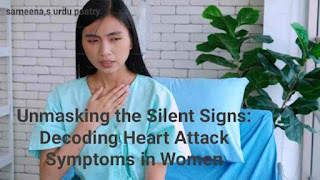Unmasking the Silent Signs: Decoding Heart Attack Symptoms in Women
Common heart attack symptoms in women
- Understanding heart attacks
- Discrepancies in symptoms between men and women
2. **Risk Factors for Heart Attacks in Women**
- Age
- Family history
- High blood pressure
- Diabetes
- Smoking
- Obesity
3. **Common Heart Attack Symptoms in Women**
- Chest pain or discomfort
- Shortness of breath
- Nausea or vomiting
- Back or jaw pain
- Fatigue
- Dizziness or lightheadedness
4. **Unique Symptoms in Women**
- Abdominal pain
- Pain in the neck, shoulder, or upper back
- Sweating
- Indigestion or heartburn
5. **Diagnosis and Treatment**
- Diagnostic tests
- Medications
- Lifestyle changes
6. **Prevention Strategies**
- Healthy diet
- Regular exercise
- Stress management
- Avoiding smoking and excessive alcohol consumption
7. **Seeking Immediate Medical Attention**
- Importance of calling emergency services
- Not delaying treatment
Common heart attack symptoms in women Heart attacks and myocardial infarctions are often perceived as health problems that are more prevalent in men. But in reality, heart attacks affect both men and women, but in different ways
.
Although chest pain is a common symptom in both men and women, women may experience many other symptoms that are not usually associated with a heart attack. Therefore, it is important to understand and recognize its signs.
introduction Understanding the symptoms of a heart attack is important for everyone, but it's especially important for women because the signs are more subtle and can be confused with other medical conditions.
Heart disease is the leading cause of death for women worldwide, highlighting the importance of recognizing symptoms specific to female physiology.
Risk factors for heart attack in women Before delving into the symptoms, it's important to know the risk factors that make women more likely to have a heart attack. These include age, family history, high blood pressure, diabetes, smoking, and obesity. A woman who has one or more of these risk factors should be especially careful when monitoring her heart health
. Common heart attack symptoms in women Chest pain is a typical symptom of a heart attack, but women may experience a wide range of symptoms, including:
Chest pain or discomfort This can manifest as a feeling of tightness, tightness, or tightness in the chest. However, some women never experience chest pain during a heart attack.
Shortness of breath
Shortness of breath or difficulty breathing may occur before or during a heart attack, and may be accompanied by chest discomfort.
Nausea or vomiting Many women experience symptoms like nausea, vomiting, or indigestion during a heart attack, and often mistake these for gastrointestinal problems.
Back and jaw pain Pain in the back, jaw, or upper abdomen may indicate a heart attack, especially if it occurs suddenly and is not associated with any other known medical conditions
. Malaise Feeling unexplained or extremely tired, even with minimal exercise, can be a warning sign of an impending heart attack.
Dizziness or lightheadedness Decreased blood flow to the brain during a heart attack can cause dizziness and fainting.
Symptoms specific to women In addition to the general symptoms listed above, women may experience specific signs during a heart attack, such as:
Stomach pain Abdominal pain or discomfort, often confused with indigestion or menstrual pain, can occur in women during a heart attack.
Pain in the neck, shoulders and upper back Discomfort or pain in the neck, shoulders, or upper back can be a sign of a heart attack, especially in women.
Sweat Women may experience sudden, unexplained sweating during a heart attack, which is often described as cold and sticky.
Indigestion or heartburn Some women experience indigestion or symptoms similar to heartburn during a heart attack, which can delay seeing a doctor
. Diagnosis and treatment Prompt diagnosis and treatment are critical to reducing the damage caused by a heart attack. Diagnostic tests such as an electrocardiogram (EKG), blood tests, and imaging tests can help confirm a heart attack.
Treatment usually includes medications to relieve symptoms, restore blood flow to the heart, and prevent further complications. Additionally,
lifestyle changes such as dietary changes, regular exercise, and quitting smoking are essential for long-term treatment.
Prevention strategies Prevention is always better than cure when it comes to heart health. A healthy lifestyle, including a balanced diet, regular physical activity, effective stress management, and avoiding smoking and excessive alcohol consumption can significantly reduce a woman's risk of heart attack.
Immediate medical attention required It is important that women seek immediate medical attention if they suspect heart attack symptoms. Time is of the essence to minimize damage to the heart muscle. Therefore, it is of utmost importance to call emergency services immediately. Delaying treatment can worsen outcomes and increase the risk of complications
. Graduation certificate It is especially important to be aware of the symptoms of a heart attack because they may manifest differently in women and men.
By recognizing the signs early and seeking immediate medical attention, women can increase their chances of survival and minimize the long-term effects of a heart attack. --
- ## FAQ
1. **Are heart attacks more common in women?**
- Yes, heart attacks are the leading cause of death for women around the world. 2. **What are the specific symptoms of a heart attack in women?** - Specific symptoms include abdominal pain, pain in the neck, shoulders, and upper back, sweating, and indigestion.
3. **can women reduce their risk of heart attack?** -
Women can reduce their risk by adopting a healthy lifestyle, including regular exercise, a balanced diet, managing stress, and avoiding smoking
. 4. **What should I do if I suspect I'm having a heart attack?**
- If you suspect a heart attack, it is important to call emergency services immediately and seek medical help.
5. **Can a woman have a heart attack without chest pain?**
- Yes, some women have heart attacks without feeling chest pain. Therefore, it is important to pay attention to other possible symptoms. ---










1 Comments
A healthy heart is so important ... recognizing the symptoms is very important as it will dictate you what to do. Very nice article, and an important one too.
ReplyDeletePlzz leave a comment and any suggestions